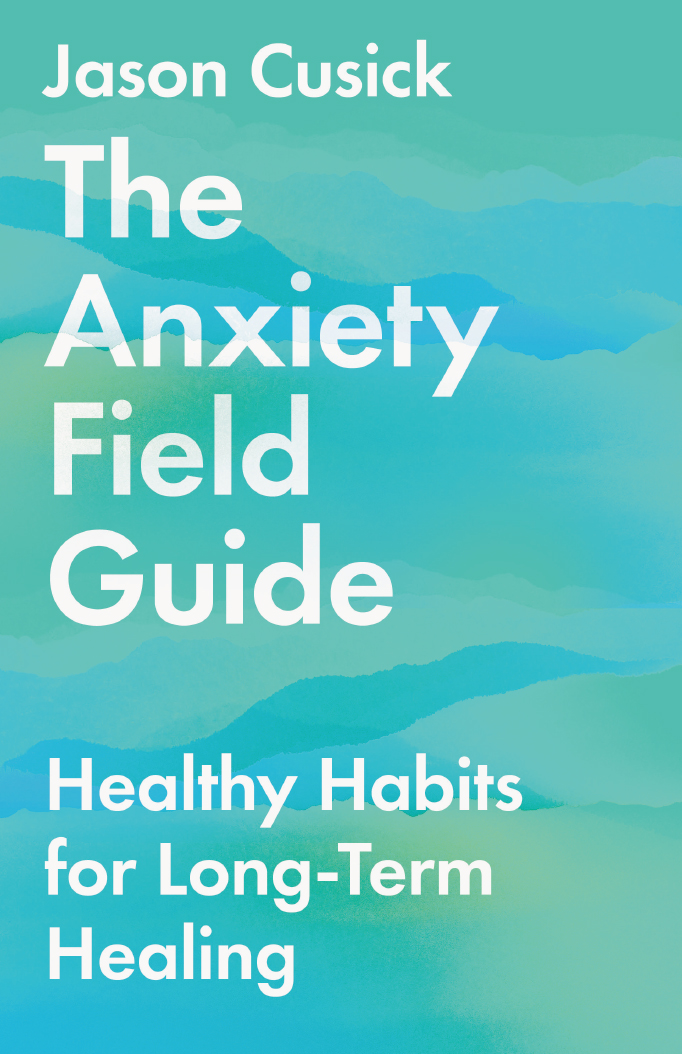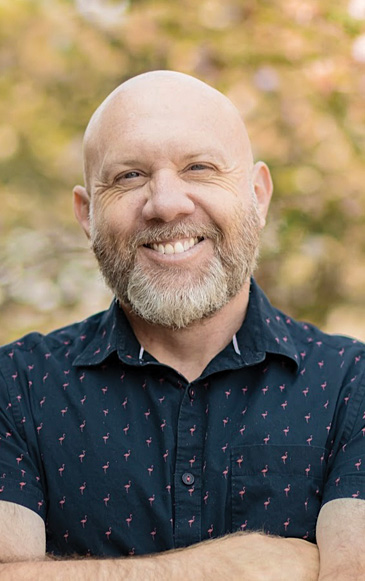Four Things I Wish I'd Known About Anxiety
By Jason Cusick, author of The Anxiety Field Guide
I have struggled with anxiety my whole life. I just didn't know it. From a young age I was a highly sensitive person. I was a creative boy. I spent a lot of time in my own head and was uniquely aware of my five senses. I also was an entertainer. I liked to make people laugh and paid more attention to what people thought of me than was healthy. Added to this, I grew up in a home that was very predictable . . . and overly clean. Years later, my mother would say that she had undiagnosed obsessive-compulsive disorder.
When I became an adult, all of these layers of my life contributed to my success as a chaplain, author, and pastor. I was thoughtful, imaginative, sensitive to others, and organized. What I didn't realize was the anxiety brewing beneath the surface—rumination, obsessive thinking, hypersensitivity, and an intolerance to uncertainty—that hit me when I accepted the call to be the new lead pastor of my church.
In my first years as lead pastor, I was having panic attacks, insomnia, and self-destructive thoughts. Through the help of some close friends, I found my way to a counselor who specialized in anxiety and OCD. That's when everything started to change for the better. I learned more about myself, my brain, and how to take control of my anxious thoughts and feelings. And the best part is I discovered a new relationship with Jesus that has brought me the peace I've been looking for.
You or someone you love struggles with anxiety. It is the number one mental wellness issue in the world today . . . and it's not going away. The good news is that there is hope. When it comes to anxiety, the move from surviving to thriving involves four basic principles that if embraced and practiced can make a world of difference.
Here are the four things I wish I'd known about anxiety.
1. Everybody Has Anxiety
Anxiety is the body's automatic response to a perceived threat. God created us marvelously complex (Psalm 139:14). We all have a small almond-shaped area in our brain called the amygdala—an alarm center that lets us know when to be afraid. At the first sign of danger, the amygdala sends signals to the body for fight, flight, freeze, or fawn. Think about the last time you got scared. You didn't have to tell your brain and body to react. They just did it. That's a gift from God! Then when the threat is gone, the alarm turns off and you calm down. That's good anxiety.
But sometimes that alarm in the brain goes off and doesn't turn off. Or the alarm goes off and there is no danger. We are suddenly nervous and we don't know why. We get triggered by something someone said or did, and we are flooded with restless thoughts and feelings. And in more serious cases, these feelings of fear and panic can interfere with our relationships, jobs, and health.
Fortunately, we are not our brains. Rather than having anxiety about our anxiety, we can practice what's called normalization. We can tell ourselves that anxiety is normal and that our brains just need to be retrained. Instead of trying to fix or stop anxiety, we can invite God into our anxious moments. With self-compassion, we can thank God for giving us such sensitive brains, even though they sometimes sense danger when it's not there. And we can ask God to help us with a patient and intentional process of changing how we respond to our anxious thoughts and feelings.
2. Anxiety Grows Through Avoidance
I learned early in life that if something is dangerous—touching a hot stove, walking across a busy street, going into a dark alley at night—I should avoid it. That's called wisdom. What I didn't realize is that the more I avoid something, the more my brain registers it as dangerous, and the more anxiety increases.
In my new role as lead pastor, I found myself avoiding difficult conversations and big decisions. The avoidance didn't calm me down. When I avoided things, it was like my brain learned, Oh, this is something to be sacred of? Okay, I'll make a note of this. When it comes around again, I'll turn on the alarm even louder! Over time, my anxiety grew.
The primary way we work through anxiety issues is by what's called exposure. Simply put, face what you fear. Start by simply imagining what makes you anxious, allow the feelings to come, and then work to remind yourself that you are okay. Next, little by little, take more steps toward what you fear. When you start to face what makes you anxious, gently acknowledge your thoughts and feelings, remember that God loves you, and invite yourself to respond differently to your anxious thoughts and feelings.
3. Care for Your Whole Self
I have never been a good sleeper. I snored for years, until I went to a sleep study and discovered I have sleep apnea. I started using a CPAP machine at night, and not only did my sleep improve but so did my mood. I also learned that the human body can't distinguish hunger from thirst. By the time you crave food, you may be dehydrated! I started drinking more water and that helped my mood too!
We are created to love God with our whole selves—heart, soul, mind, and strength (Deuteronomy 6:5; Mark 12:30). Anxiety isn't just about what's going on in our head; it's about our integrated selves. In addition to normalization and exposure, I learned about care. Self-care involves our diet, rest and sleep, exercise, healthy scheduling, managing screen time, guarding content we take in, fun hobbies, affirming friendships, and counseling that is focused on exposure and response prevention. This last one is important. I have always been used to traditional talk therapy, but when it comes to anxiety, talking about my problems is another way I ruminate. I need skills! I also found some low-dose medications that got me out of the slump so I could hone my skills.
Make a simple list of different areas of your life in which you could be healthier and happier. You might not think they are connected to anxiety, but they could be! Find some supportive friends who can encourage you to be an overall healthier person.
4. Say YES to Becoming More Resilient
Think of something you used to be afraid of and are not afraid of anymore—the dark, riding a bike for the first time, fear of the water. Now you go to sleep with blackout curtains, bike ride for leisure, and love swimming. How did you do it? You realized that it's okay to be afraid, and then you faced your fear (multiples times). Maybe you got hurt but you had supportive people who cared for you. The anxiety didn't go away. Your brain still sends a little alarm when the lights click off, you mount a two-wheeled vehicle, or you jump into a large amount of liquid, because there is still danger. But what's happened is you are less anxious about it.
Desensitization is when we are less reactive to the anxiety we have. Again, anxiety can be good. It's a warning signal protecting us from danger. Wisdom is knowing what to fear and what not to fear. There's a great story in the New Testament of Jesus walking on water and inviting one of his followers to join him (Matthew 14:22-33). Jesus invites his friend Peter (a fisherman!) to step out of a boat and walk to him on the water. In the same way, Jesus is inviting us to take slow steps of faith toward him rather than focusing on what we fear. Like Peter, we might falter and sink, but as we grow more sensitive to God's love for us and less sensitive to the false alarms in our brain, we can find long-lasting healing from anxiety.
Discover more Christian books on anxiety as well as resources for Mental Health Awareness Month.
About the Author
Watch this video conversation between Jason Cusick and Dr. Carol from the Dr. Carol Ministries podcast. Learn even more from Jason as he tells the story of his own history with anxiety and offers insight and practical guidance to help you overcome.





